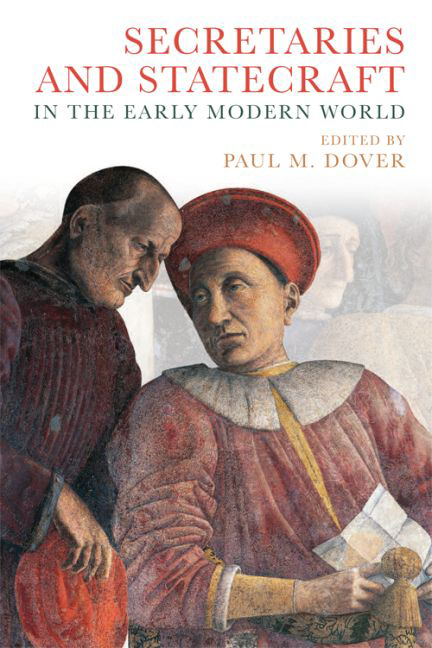Book contents
- Frontmatter
- Contents
- List of Contributors
- 1 Introduction: The Age of Secretaries
- 2 Records, Politics and Diplomacy: Secretaries and Chanceries in Renaissance Italy (1350–c. 1520)
- 3 Mercurino di Gattinara (1465–1530): Imperial Chancellor, Strategist of Empire
- 4 ‘This continuous writing’: The Paper Chancellery of Bernhard Cles
- 5 Parables and Dark Sentences: The Correspondence of Sir William Cecil and William Maitland (1559–73)
- 6 Axel Oxenstierna and Swedish Diplomacy in the Seventeenth Century
- 7 Statecraft and the Role of the Diplomat in Ducal Savoy: The Career of Alessandro Scaglia (1592–1641)
- 8 Richelieu, Mazarin and Italy (1635–59): Statesmanship in Context
- 9 The Learned Ideal of the Mughal Wazīr: The Life and Intellectual World of Prime Minister Afzal Khan Shirazi (d. 1639)
- 10 Reconsidering State and Constituency in Seventeenth-Century Safavid Iran: The Wax and Wane of the Munshi
- 11 Choreographers of Power: Grigorii Kotoshikhin, State Secretaries and the Muscovite Royal Wedding Ritual
- 12 Eberhard von Danckelman and Brandenburg's Foreign Policy (1688–97)
- 13 Chancellor of State: Prince Wenzel Anton Kaunitz, the Habsburg Foreign Office and Foreign Policy in the Era of Enlightened Absolutism
- Index
2 - Records, Politics and Diplomacy: Secretaries and Chanceries in Renaissance Italy (1350–c. 1520)
Published online by Cambridge University Press: 21 November 2017
- Frontmatter
- Contents
- List of Contributors
- 1 Introduction: The Age of Secretaries
- 2 Records, Politics and Diplomacy: Secretaries and Chanceries in Renaissance Italy (1350–c. 1520)
- 3 Mercurino di Gattinara (1465–1530): Imperial Chancellor, Strategist of Empire
- 4 ‘This continuous writing’: The Paper Chancellery of Bernhard Cles
- 5 Parables and Dark Sentences: The Correspondence of Sir William Cecil and William Maitland (1559–73)
- 6 Axel Oxenstierna and Swedish Diplomacy in the Seventeenth Century
- 7 Statecraft and the Role of the Diplomat in Ducal Savoy: The Career of Alessandro Scaglia (1592–1641)
- 8 Richelieu, Mazarin and Italy (1635–59): Statesmanship in Context
- 9 The Learned Ideal of the Mughal Wazīr: The Life and Intellectual World of Prime Minister Afzal Khan Shirazi (d. 1639)
- 10 Reconsidering State and Constituency in Seventeenth-Century Safavid Iran: The Wax and Wane of the Munshi
- 11 Choreographers of Power: Grigorii Kotoshikhin, State Secretaries and the Muscovite Royal Wedding Ritual
- 12 Eberhard von Danckelman and Brandenburg's Foreign Policy (1688–97)
- 13 Chancellor of State: Prince Wenzel Anton Kaunitz, the Habsburg Foreign Office and Foreign Policy in the Era of Enlightened Absolutism
- Index
Summary
INTRODUCTION
In August 1458, the Duke of Milan Francesco Sforza wrote in his own hand a letter to Cardinal Capranica, one of the potential candidates for the papacy, to reassure the prelate of his support. At the end of a letter both long and politically explicit, Sforza concluded that ‘I have been the chancellor of myself in writing all this letter: if the letter is bad, I am sorry, but soldiers write badly, as your Lordship knows.’ A few years later, and still in Milan, a charter of privilege granted to the Milanese chancellor Cicco Simonetta by Francesco's widow Bianca Maria and his eldest son Galeazzo Maria Sforza shortly after the death of Francesco summarised the secretary's tasks in an impressive list of gerundives connected to the main duty of actively mastering the spoken and written word: Simonetta deserved the duke's gratitude for his restless activity of ‘conferendi, proponendi, tractandi, ventilandi, discutiendi et concludendi […] faciendi, agendi, procurandi, exequendi et executioni mandari faciendi […] committendi, imponendi, dictandi, conficiendi, ordinandi, residendi, signandi, scribendi, subscribendi, ac rogandi’. Astute political reasoning, a particular attitude to writing, secrecy, professionalism: the words of a duke renowned for both his unconventional education and his strategic use of the written and spoken word, and this extended sequence of chancery gerundives define the daily work of one of the most famous secretaries of fifteenth-century Italy. In these words we can see laid out the broad scope and blurred boundaries of the world of Renaissance chancellors and chanceries, and catch a glimpse of their immense influence and potential.
In recent years, as research on both literacy and power in Renaissance Italy has focused on the development of the larger territorial powers, chancelleries and public written records have increasingly attracted scholarly attention. The process of territorial growth stimulated the formalisation and diffusion of shared political languages that required novel written forms and innovative documentary practices. During a long Quattrocento that stretches roughly from 1350 to 1520, almost everywhere in Italy the central chancery – as the most important centre for the production of public written records – also became the heart of public authority, power and legitimacy, monopolising more and more the decision-making process. At the heart of such loci of power were the lay professionals of written communication: chancellors, secretaries and notaries.
- Type
- Chapter
- Information
- Secretaries and Statecraft in the Early Modern World , pp. 16 - 36Publisher: Edinburgh University PressPrint publication year: 2016

